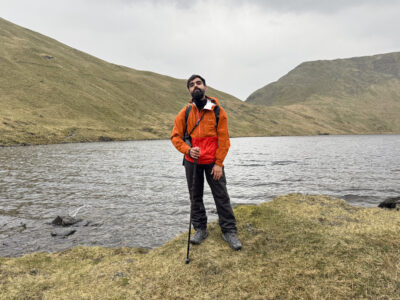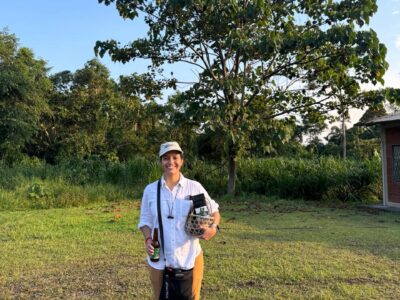
1. What drew you to the Master of Public Administration in Environmental Science and Policy program (MPA-ESP)?
The urgency of the times- we are in dire need of finding sustainable solutions to our environmental challenges and this requires the participation of all stakeholders and innovative solutions that I felt could only be gleaned from the MPA-ESP program. I also wanted to move to New York to expand my professional network and strengthen my interpersonal skills in one of the fastest-paced cities in the world.
The uniqueness of the MPA-ESP program and the knowledge and skills it would provide me with to make a difference were also strong determining factors in my decision to apply to the program. I felt with a fair degree of certainty that this year in New York would transform my life and give me a competitive edge. Most importantly, I chose the MPA-ESP program due to my desire to become an expert and work with integrity to create a better world.
2. What were you doing before you started the program and why did you chose to come to Columbia University?
Prior to the program, I was a student at McMaster University completing my Bachelor’s degree in finance and economics. Additionally, I worked at several organizations such as Loblaw Companies, which solidified that a career in the environmental realm was really what I wanted. When I found the MPA-ESP program online, I knew that I had to apply. I packed my stuff, moved from Toronto to New York and started to study for my dream to come to fruition.
3. What area of environmental management are you most interested in?
To have the greatest positive impact on our environment, it is my belief that we need to focus on increased investments in the environmental sector. Environmental projects are unique because oftentimes they require a lot of short-term investment for a long-term return. Hence, on paper they could be less attractive and that is why we are experiencing a slow transition and limited interest.
I desire to enter the investment field and generate funds to be used for environmental research and development of clean technology. My desire is to make technologies such as renewable energies more commonplace and affordable to increase their usage for the betterment of society.
4. What skills and tools do you hope to acquire through the program?
The program offers robust training to collaborate with people of varying age, ethnicities and experiences. Learning to work together effectively and efficiently in such a diverse environment is a skill in and of itself. I hope to master this skill. I also hope to improve my public speaking and presentation skills.
Thus far, we have made numerous presentations in the program and each time I have to prepare for one of these, I can feel the process becoming easier. Training and skill building are tenets of the program and you are forced to learn to think quickly but deeply and to work at a much higher level.
Last semester, I participated in the SIPA Consulting Case Competition and was placed in a group with students that I had never met. Our task was to solve a real case prepared for us by Deloitte and present our solution to a panel of experienced industry professionals. By channeling all of the skills I had acquired from the program, our group was able to defeat the other teams. The program gave us the skills we needed to look at complex problems in their entirety and break them down into simple, manageable solutions.
5. What is your favorite class in the MPA-ESP program so far, and why?
My favorite class so far has been the Workshop in Applied Earth Systems Management taught by Executive Director Steven Cohen. During the summer I had the opportunity to be the Manager for the team of 10 students. I faced many challenges being the youngest member of the group since my team was comprised almost entirely of international students who were significantly older than myself. The workshop dealt primarily with identifying problems, the science behind those problems, the solutions and the science behind the solutions.
Additionally, the workshop focused on how to set up a new agency. It taught you how to create the organizational structure, formulate a budget, devise a calendar of essential activities and other integral processes. The workshop truly honed my leadership abilities and I learned many managerial skills such as meeting deadlines, communicating effectively and conflict resolution. Above all, the workshop taught me the benefits of working in a team toward a common goal, that communication is essential and that everyone has a role and those roles must be clearly outlined to avoid conflict. It was one of most defining classes of my academic experience.
6. How do you intend to utilize your time during the final semester to further your career?
Columbia University is a perfect place for students to take on initiatives outside the classroom. During the fall semester I had the opportunity to partner with the Earth Institute and organize a panel discussion on the “Broader Assessment of Energy in New York City.” This panel helped me connect some of the accomplished Columbia faculty, SIPA Alumni and current students.
In my final semester, I will be organizing more events like this. It is my intent to use forums such as these to teach students green investment strategies that can expedite and transform our economy. As part of my internship with the Earth Institute, I am also working to create a green procurement index for China. I hope to gain better implementation and practical skills to deliver quality work that could formalize green procurement in China.
****
Students in the MPA in Environmental Science and Policy program enroll in a year-long, 54-credit program offered at Columbia University’s School of International and Public Affairs, in partnership with the Earth Institute.
Since it began in 2002, the MPA in Environmental Science and Policy program has given students the hands-on experience, and the analytical and decision-making tools to implement effective environmental and sustainable management policies. The program’s 741 graduates have advanced to jobs in domestic and international environmental policy, working in government, private and non-profit sectors. Their work involves issues of sustainability, resource use and global change, in fields focused on air, water, climate, energy efficiency, food, agriculture, transportation and waste management. They work as consultants, advisers, project managers, program directors, policy analysts, teachers, researchers and environmental scientists and engineers.
Visit our website for more information: http://mpaenvironment.ei.columbia.edu/



